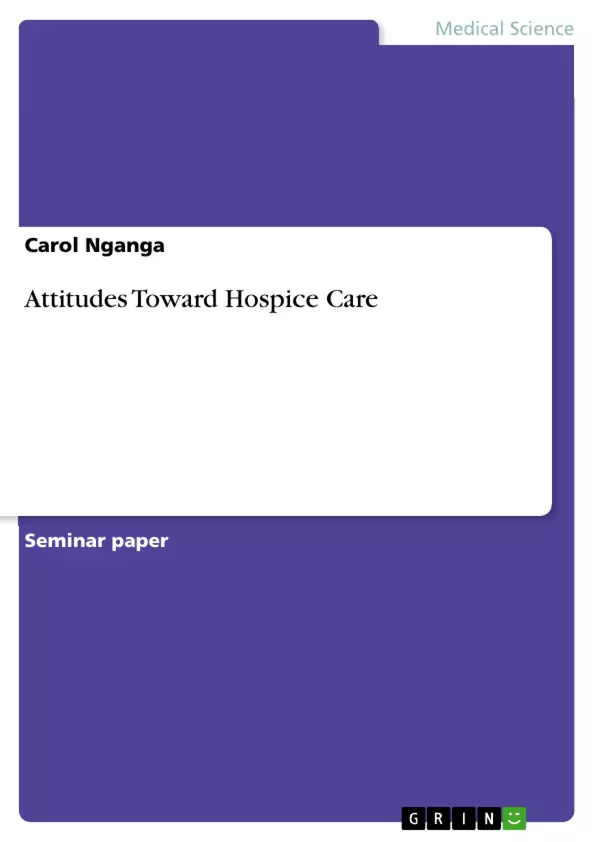There is perhaps no more confusing mental process in life than attempting to define attitudes toward death. This process is even more complicated and impacting when it must be formulated by health practitioners who work in a hospice setting. It has been found that there exists a significant percentage (33%) of hospice nurses which found difficulty in knowing who controlled the overall responsibility of hospice patient care. Such confusion has led to an overwhelming desire by both community nurses and general practitioners for additional educational input from domiciliary services (Seamark, Thorne, Jones, Gray, & Searle, 1993, p. 57). There is little doubt that the health care professional finds themselves in a complex organizational system and must find a way to form their own outlook within that system. Nurses want to simultaneously maintain fidelity to patients and their family members, follow physician colleague orders, work in interdisciplinary family-centered teams, and yet follow their consciences when order care or treatments appear harmful to patients (Catlin et al., 2008, p. 106). The complexities of the situation in which hospice professionals find themselves in makes the defining of personal attitudes toward hospice care even more difficult.
There were an estimated 1.5 million patients who received hospice services in 2012 (NHPCO, 2013, p. 4). Therefore, a large patient population is directly effected by the outlooks which hospice clinicians take towards end of life care. Since the main focus of palliative care should be maximizing the quality of care of the hospice patient, health practitioners must adopt an attitude towards patients which maximizes the probability of the highest quality of life.
Inhaltsverzeichnis (Table of Contents)
- Attitudes Toward Hospice Care
- Normative Position
- Patient Characteristic Considerations
- Communication Considerations
- Opposing Viewpoints
- Conclusion
Zielsetzung und Themenschwerpunkte (Objectives and Key Themes)
This text aims to examine the ethical considerations and challenges faced by healthcare professionals in the context of hospice and palliative care. It analyzes the importance of adopting a patient-centered, culturally sensitive approach to end-of-life care, emphasizing the significance of communication, respecting patient autonomy, and navigating conflicting viewpoints.
- The ethical framework of hospice care
- The impact of patient characteristics on treatment decisions
- The role of communication in enhancing patient well-being
- Navigating conflicting perspectives on end-of-life care
- The importance of patient autonomy and respecting their wishes
Zusammenfassung der Kapitel (Chapter Summaries)
The text begins by exploring the complexities of attitudes toward death, particularly within the hospice setting. It highlights the challenges faced by healthcare professionals in balancing patient care with institutional guidelines and ethical considerations. The text then delves into the concept of normative ethics, advocating for a patient-centered approach that considers individual needs and cultural variations.
Further, the text examines the role of patient characteristics, such as cultural background, ethnicity, and gender, in influencing hospice care decisions. It addresses barriers to hospice enrollment and the need for culturally sensitive care. The importance of effective communication between healthcare providers and patients is emphasized, along with the need to address potential anger and fear among hospice patients.
The text concludes by discussing opposing viewpoints regarding the role of family members in end-of-life decisions and highlighting the importance of respecting patient autonomy and wishes. A case study involving Dr. Daniel Matlock illustrates the potential conflicts between professional guidelines and patient-centered care.
Schlüsselwörter (Keywords)
This text focuses on key topics such as hospice care, palliative care, normative ethics, cultural sensitivity, patient autonomy, communication, end-of-life decision-making, and conflicting viewpoints. It also explores themes related to patient characteristics, cultural variations, and ethical dilemmas faced by healthcare professionals in the hospice setting.
Frequently Asked Questions
What are the main ethical challenges for hospice nurses?
Nurses must balance fidelity to patients, following physician orders, and their own moral conscience within complex organizational systems.
How does culture affect hospice care?
Patient characteristics like ethnicity and cultural background significantly influence attitudes toward death and end-of-life treatment decisions.
What is the focus of palliative care?
The primary focus is maximizing the quality of life for patients through symptom management and psychological support.
Why is communication critical in hospice settings?
Effective communication helps address the fear and anger of patients and ensures that their autonomy and final wishes are respected.
What is a "normative position" in hospice ethics?
It refers to the patient-centered approach that serves as the ethical standard for high-quality end-of-life care.
- Citar trabajo
- Carol Nganga (Autor), 2013, Attitudes Toward Hospice Care, Múnich, GRIN Verlag, https://www.grin.com/document/280536



